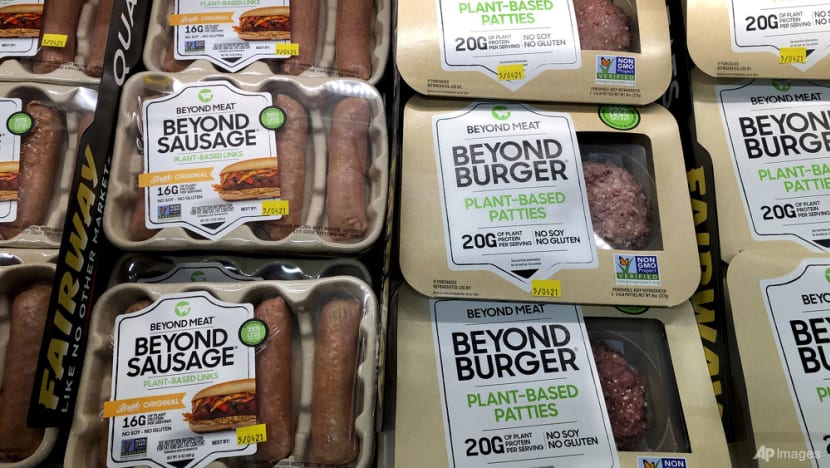Rising prices could sour consumer appetite for plant-based meat alternatives
Is there still demand for meat substitutes? Rising inflation is eating into the plant-based food sector's years of solid growth.

NEW YORK: Serving up classic burgers and sides but with untraditional plant-based ingredients, fast food joint Marty’s V Burger has amassed a cult following in New York City over the years.
The eatery, started by former commercial and charter pilot Marty Krutolow several years ago, offers completely vegan and plant-based options.
“We do burgers, we have five different kinds of fries, we have drumsticks, mac and cheese, cajun cheesy pepper steaks. So we’re the quintessential fast food,” said Mr Krutolow.
“In the beginning, when Beyond Meat and Impossible Foods launched, the buzz was out there and people were like, ‘Where can we get this?’. And we were one of the few places that carried their products.”
Plant-based meat alternatives have grown in popularity in recent years as more people look to cut back on meat, but rising inflation could sour the appetite of consumers.
Prices for plant-based meat remain more expensive than animal products, observers pointed out, and with less money in their pockets, consumers are finding meat substitutes less attractive.
In recent weeks, investors have been taking a bite out of plant-based protein brand Beyond Meat’s stock, on fears that the demand for meat substitutes is starting to slow.
It's a trend seen across the sector, and also a concern for some dairy milk alternative brands.
COOLING PLANT-BASED FOOD SALES
Mr Arun Sundaram, vice president of equity research at CFRA Research, said the rate of new consumer adoption has slowed.
“It’s largely down to a lot of these macro things that we’ve been seeing, like high inflation, high interest rates, that’s been slowing the rate of consumer adoption right now,” he added.
In 2020, sales of plant-based food in the United States jumped 27 percent compared to the year before, pushing the market value of the wider sector to around US$7 billion.
However, sales have cooled in recent months.
Plant-based food maker Beyond Meat, for instance, has been hit hard and has planned for job cuts. Its shares have sunk by about 75 percent this year.
But Beyond Meat’s new partnership with fast food chain Taco Bell could increase the brand’s exposure and help boost its sales, said analysts.
REPOSITIONING AS PROTEIN ALTERNATIVE
Some believe these businesses should position themselves as a protein alternative, rather than a direct substitute for meat.
Professor Priya Raghubir of the New York University Stern School of Business said: “If it’s repositioned in an appropriate manner, with appropriate reference to taste expectations, it can live alongside tofu.”
Meanwhile, plant-based milks are not immune from headwinds facing the broader sector, said experts.
While it is a more established market, investors fear inflation could hurt sales for brands such as Oatly. The oat milk company has seen its shares slide more than 80 per cent from the highs that it hit last year.
“The rate of new consumer adoption for plant-based milk is slowing down because of high inflation, but existing customers who have already adopted ... are not really those turning away and buying animal milk,” said Mr Sundaram.
Despite the plant-based market facing a slip in demand after years of growth, industry observers are confident that an appetite for these products is here to stay.















